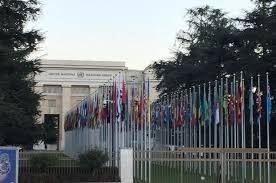
Seventh session of the Forum on Minority Issues on “Preventing and addressing violence and atrocity crimes targeted against minorities”
Statement by Minority Rights Group Europe and International
17 December 2014
Thank you Mr Chairperson,
Minority Rights Group would like to draw the Forum’s attention to the increase in ethnically motivated violence targeted towards persons of Central Asian origin in the Russian Federation. Persons of Central Asian origin comprise the majority of the estimated 11 million migrant population living and working in the territory of the Russian Federation; and many more are of course citizens.
The difficulty in obtaining legal status, including registration, work permits and residency forces many persons of Central Asian origin into undocumented labour, placing them under the control of their employers and many at risk of exploitation The stereotyping of labour migrants as ‘illegal’ readily associates persons of Central Asian origin in the public mind with criminality and feeds marked trends in increasing racism and xenophobia in the Russian Federation.
In October 2013, in the Biryulovo district of Moscow, riots broke out, following allegations that the murder of a local man was committed by a migrant from ‘either Central Asia or the Caucasus’. The ensuing riot by members of the public saw properties and businesses belonging to minorities attacked by a large mob. The response of the police authorities was to quell the protest through the arbitrary arrest of approximately 1,200 migrant workers. Accounts by those detained, describe the arrests as seemingly made on the basis of physical appearance and with little respect given towards due process norms.
While this incident was a very public example of the threat towards persons of Central Asian origin in the Russian Federation, most cases remain unseen. A civil society report, in 2013, highlighted cases of 13 killings and 45 serious injuries, all involving victims of Central Asian origin. This is likely to represent only a small percentage of actual cases. The uncertain legal status of many persons of Central Asian origin, intolerant public attitudes and the lack of an appropriate response by police authorities, create a culture of impunity for those committing such acts of violence. This has led to increasing confidence amongst violent far right and nationalist groups, as demonstrated by the recent trend of so-called ‘white wagons’, where extremist groups target and beat all non-white passengers in train carriages.
Such violence does not just impact on migrants, but also Russian citizens of Central Asian origin and more broadly any citizen of supposed non-Slavic appearance. The insecurity facing people of Central Asian origin and other minorities requires a far-reaching and systematic response by the Russian Federation government. However, we would like to focus attention on the role of policing and judicial authorities, especially in combating impunity.
The Russian Federation’s ‘Law on Police’ has many commendable provisions which prohibit ill-treatment of ethnic minorities, including anti-migrant and anti-Roma violence. Indeed, the Russian Federation has many welcome laws for the protection of minorities. However, there is clearly a significant gap in enforcement of these provisions. MRG believes the adoption of draft Recommendation 24 by the Forum is important in this context, and that the Russian Federation and other states need to adopt inclusive and proactive measures, that ensure the application of good practices by their law enforcement agencies. For implementation to be effective, we welcome the draft Recommendation’s emphasis on the need to develop mechanisms for consultation with and public oversight by minority communities.
As a part of such efforts to develop good practices, the Russian Federation should provide training to law-enforcement officials, with a view to eradicating the practice of ‘ethnic profiling’. The Russian Federation should also ensure that instances of harassment, mistreatment and arbitrary arrest by law-enforcement officials of representatives of minorities are investigated, with a view to bringing the perpetrators to justice. Finally, the Russian Federation authorities should build on the positive provisions contained in the Law ‘On Police’, by ensuring its full enforcement.
Given the situation facing persons of Central Asian origin in the Russian Federation, we would suggest that draft Recommendation 16 be amended to include long-standing situations of undocumented or uncertain migration status and not solely focus on statelessness as a contributing factor to minority vulnerability.
Finally, Mr. Chairman:
I take this opportunity to mention that, this week, MRG is launching its report: Protecting the Rights of Minorities and Indigenous Peoples in the Russian Federation: Challenges and Ways Forward which contains a comprehensive analysis of the situation facing minorities in that country.